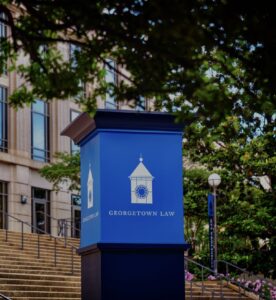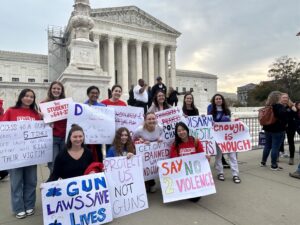Attorneys from the Institute for Constitutional Advocacy and Protection (ICAP), a nonpartisan institute within the Georgetown Law Center, are representing the respondent in Trump v. CASA Inc., a case set to go before the Supreme Court for oral arguments this week, on May 15.
Trump v. CASA Inc. is one of three consolidated cases to go before the Court on the issue of whether lower court judges can block Trump’s policies through nationwide injunctions, court orders that stop the enforcement of a policy across the country.
The Supreme Court’s announcement that they would listen to the consolidated cases comes after the Trump Administration appealed a lower court ruling on Trump v. CASA Inc. This ruling issued a nationwide injunction blocking Trump’s executive order that denied birthright citizenship to certain children born in the U.S.
The consolidated cases were placed on the Supreme Court’s emergency docket, extending oral arguments, which traditionally conclude in April, to May. While the court is posed to rule on nationwide injunctions, it has not specified whether they will discuss the original question of Trump v. CASA regarding the constitutionality of restrictions on birthright citizenship.
The Supreme Court director of ICAP, Kelsi Brown Corkran, will deliver oral arguments on May 15, after the Court approved a motion for joint argument. Six attorneys from ICAP represent five pregnant mothers and two immigrant-rights organizations in the case.
Attorneys representing the Trump administration requested that the Supreme Court deny lower courts the authority to issue nationwide injunctions.
“This Court should declare that enough is enough before district courts’ burgeoning reliance on universal injunctions becomes further entrenched,” attorneys for the Trump Administration wrote in an appeal.
ICAP declined the Voice’s request for comment, but they explained their involvement in Trump v. CASA Inc. in a statement published on their website.
ICAP argues that the birthright citizenship executive order will impact the citizenship status of children born to parents who are in the U.S. on visas, have Temporary Protected Status, or are undocumented.
“Some have lived, worked, and paid taxes here for decades and have U.S.-citizen children. Some own homes here,” ICAP wrote. “All have the expectation that their children born here will have the cherished status of a U.S. citizen that is guaranteed by the Constitution.”
Attorneys from ICAP argue that the executive order should be struck down with a nationwide injunction, and that lower courts must be allowed to issue these injunctions to ensure consistent application of the law in all 50 states.
“The universal injunction in this case preserves the uniformity of United States citizenship, an area in which nationwide consistency is vitally important,” attorneys from ICAP wrote in their opposition to Trump’s appeal. “Whether a child is a citizen of our nation should not depend on the state where she is born or the associations her parents have joined.”
Attorneys from ICAP say that denying courts the ability to issue nationwide injunctions will allow the birthright citizenship executive order to take effect, despite ICAP arguing that it is unconstitutional. Most recently, the Court of Appeals for the Fourth Circuit ruled in favor of ICAP, affirming that Trump’s executive order is unconstitutional.
“Birthright citizenship is guaranteed by the 14th Amendment and has been recognized by the Supreme Court as the law of the land for over 100 years,” Rupa Bhattacharyya, legal director at ICAP, said during a press call. “The president of the United States has no power to amend the Constitution with the stroke of a pen on an executive order.”
The Trump administration argued that the 14th Amendment does not universally apply to those with immigrant parents.
“The Fourteenth Amendment has always excluded from birthright citizenship persons who were born in the United States but not ‘subject to the jurisdiction thereof,’” the executive order states. “Among the categories of individuals born in the United States and not subject to the jurisdiction thereof, the privilege of United States citizenship does not automatically extend.”
If the Supreme Court rules in favor of the Trump Administration, those opposing Trump’s recent policies will have lost their main avenue for halting his actions. Nationwide injunctions issued to pause anti-diversity and anti-refugee initiatives, cuts to scientific research, and freezes on federal grant spending may be overturned.
The Supreme Court is expected to release a decision on the three nationwide injunction cases by mid-June or early July, when the Court’s term concludes.





